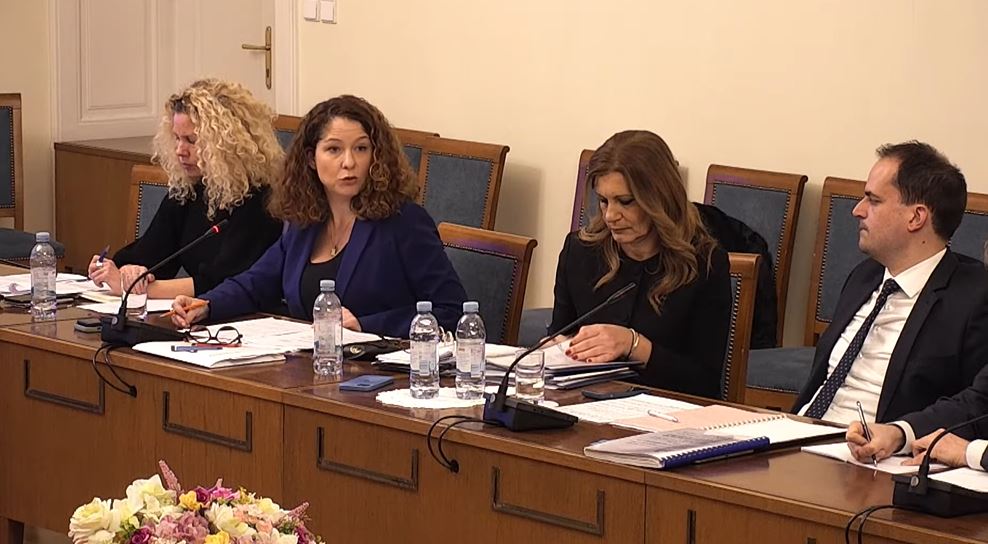Ombudswoman Tena Šimonović Einwalter participated in the session of the Judiciary Committee of the Croatian Parliament on 17 January 2024, during the debate on the draft amendments to the Criminal Code, the Criminal Procedure Act, and the Protection against Domestic Violence Act.
She welcomed the introduction of the definition of gender-based violence and the new criminal offence of “Aggravated murder of a female person” into the criminal legislation, considering them important steps forward in combating violence against women. However, she emphasised that alongside these legal changes, it is crucial to educate professionals on gender-based violence and to place strong emphasis on violence prevention, including through the education system.
Regarding the proposed introduction of a new offence, “Unauthorised disclosure of the content of investigative or evidentiary actions,” she outlined several aspects that should be considered in the legislative procedure. Amendments should ensure that, if adopted, the new offence is proportionate to its intended aim and does not produce negative legal consequences in practice.
Public interest – media freedom, right to information and whistleblower protection
If the new offence is enacted, she stressed that disclosures made in the public interest must be excluded from its application, so as not to impede anti-corruption efforts, press freedom or the public’s right to information.
Although the provision states journalists cannot be held criminally liable, its current wording may deter sources from sharing information of public relevance. She therefore argued that actions undertaken in the public interest should not be deemed unlawful and proposed that whistleblowers (reporting persons) be explicitly exempted as well. Under the current proposal, they could face criminal liability for reporting or disclosing wrongdoing. Yet the state is obliged—under Directive (EU) 2019/1937 and the Whistleblower Protection Act—to ensure safe and reliable reporting channels, including public disclosures.
Rights of defendants and victims
She also called for clarification of the provision to protect the rights of both defendants and victims. As currently drafted, even witnesses—which may include victims—could potentially be criminally liable for speaking publicly about their case. Meanwhile, defendants and their lawyers are explicitly listed as potential offenders, which could undermine the presumption of innocence by preventing them from responding to publicly released information potentially harmful to the defendant.
The context in which the new criminal offence is being proposed
Although the proposed criminal offence mirrors legislation already in place in several Council of Europe member states, it is essential to assess the specific context in Croatia—namely, the circumstances in which such an offence would take effect.
Public opinion research shows that trust in the judiciary in Croatia is low, in part due to the limited and often delayed information made available to the public through official statements. A further complication is that it can take several years before an indictment is confirmed—precisely the period that the proposed offence of “Unauthorised disclosure of the content of investigative or evidentiary actions” would cover.
Finally, while recognising the genuine need to protect the right to a fair trial and the privacy of defendants—particularly in past instances when information was leaked to the media—it is legitimate to ask whether the intended purpose could be achieved by less restrictive means. This could include better application of the existing provisions of the Criminal Code and disciplinary procedures for public officials who unlawfully disclose sensitive information.
Violence against older persons in the family
Speaking on the draft amendments to the Protection Against Domestic Violence Act, Ombudswoman Šimonović Einwalter highlighted that, back in 2017, it was at the initiative of her Office that older persons were formally recognised in the law as a particularly vulnerable group.
However, the current provision stipulates harsher penalties for acts of domestic violence committed in the presence of an older person (alongside a child or a person with a disability). Equating all individuals over 65 with children in this context is not justified and sends the wrong message from the state.
Not all people over 65 are automatically in a position of vulnerability, and witnessing violence does not have the same psychological impact on them as it does on children, who are in a formative stage of development. The provision, therefore, needs to be reworded—for example, to refer specifically to instances where violence is committed in the presence of a frail or dependent elderly person.
Drawing on her office’s experience and broad engagement with elder abuse, she also proposed that representatives of the Ombudswoman’s office be included in the Commission for Monitoring and Enhancing the Work of Bodies Involved in Criminal and Misdemeanour Proceedings and the Enforcement of Sanctions related to Domestic Violence Protection.
In conclusion, Ombudswoman Šimonović Einwalter expressed her hope that these arguments would be considered before the proposals are presented to Parliament for second reading, and that the solutions would be integrated into the final draft.
She also discussed these topics on Croatian Radio’s U mreži Prvog, and the session of the Parliamentary Judiciary Committee is available for viewing online.





